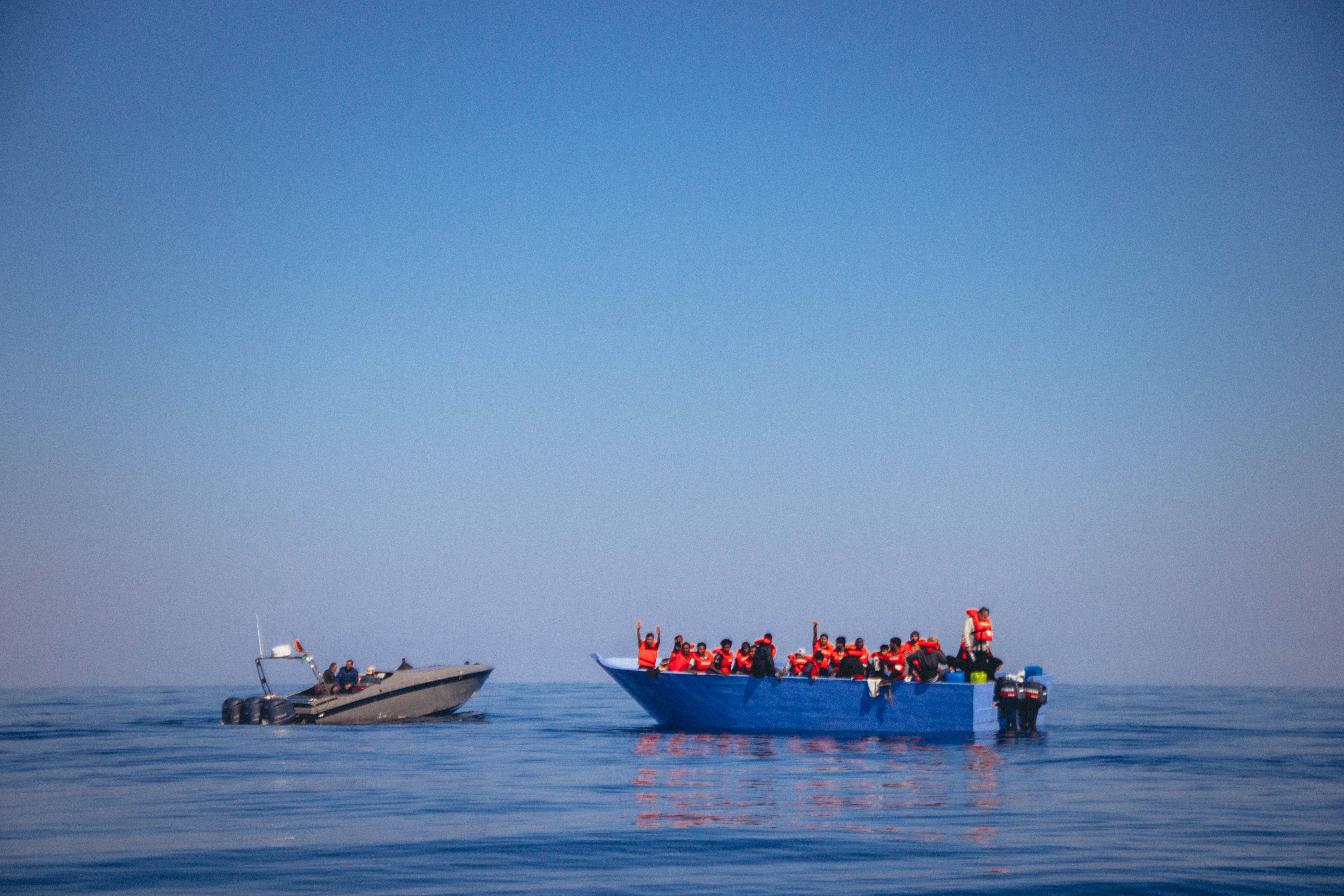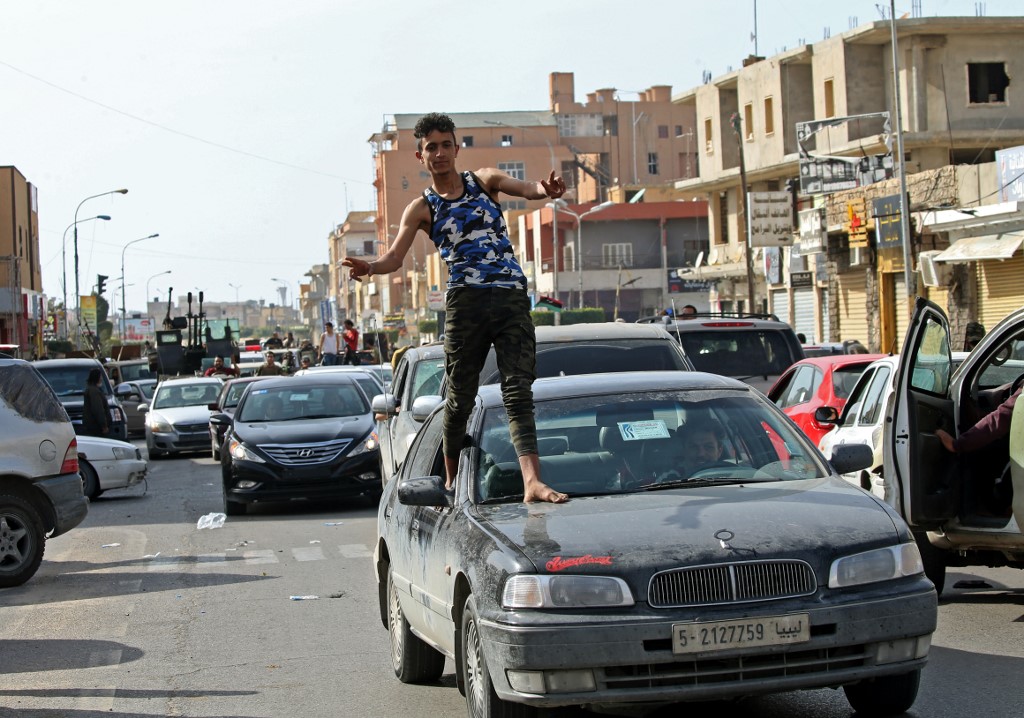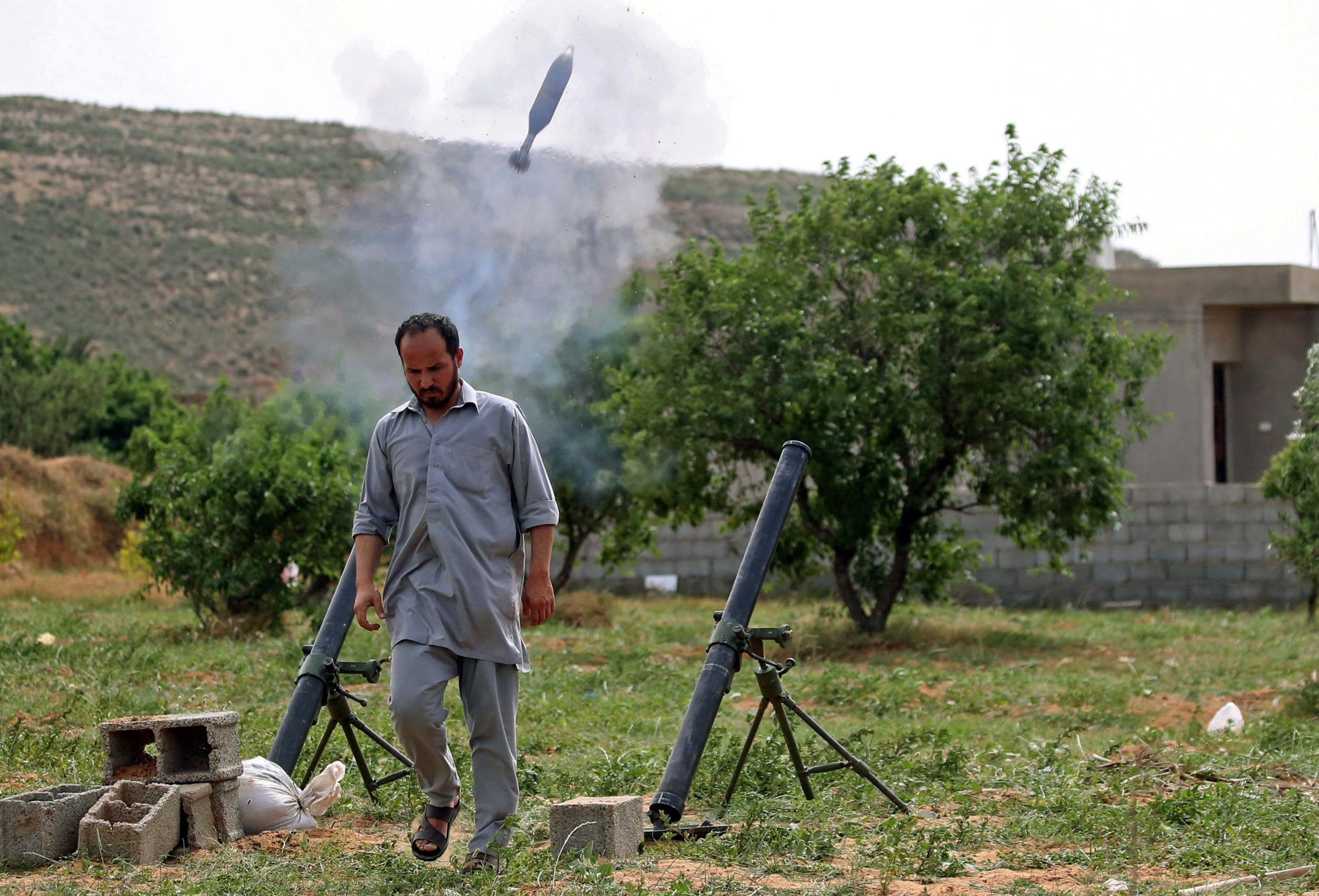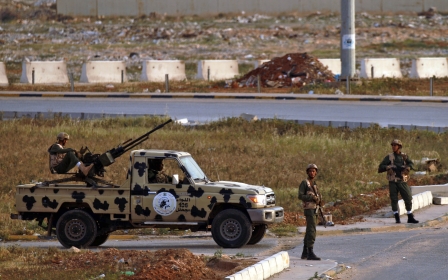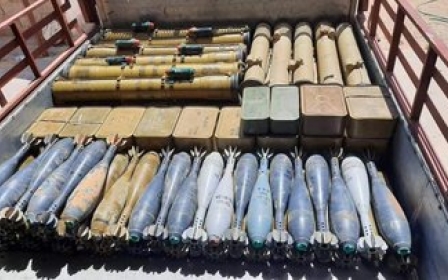Libya's people-smuggling militias return just in time for migrant season
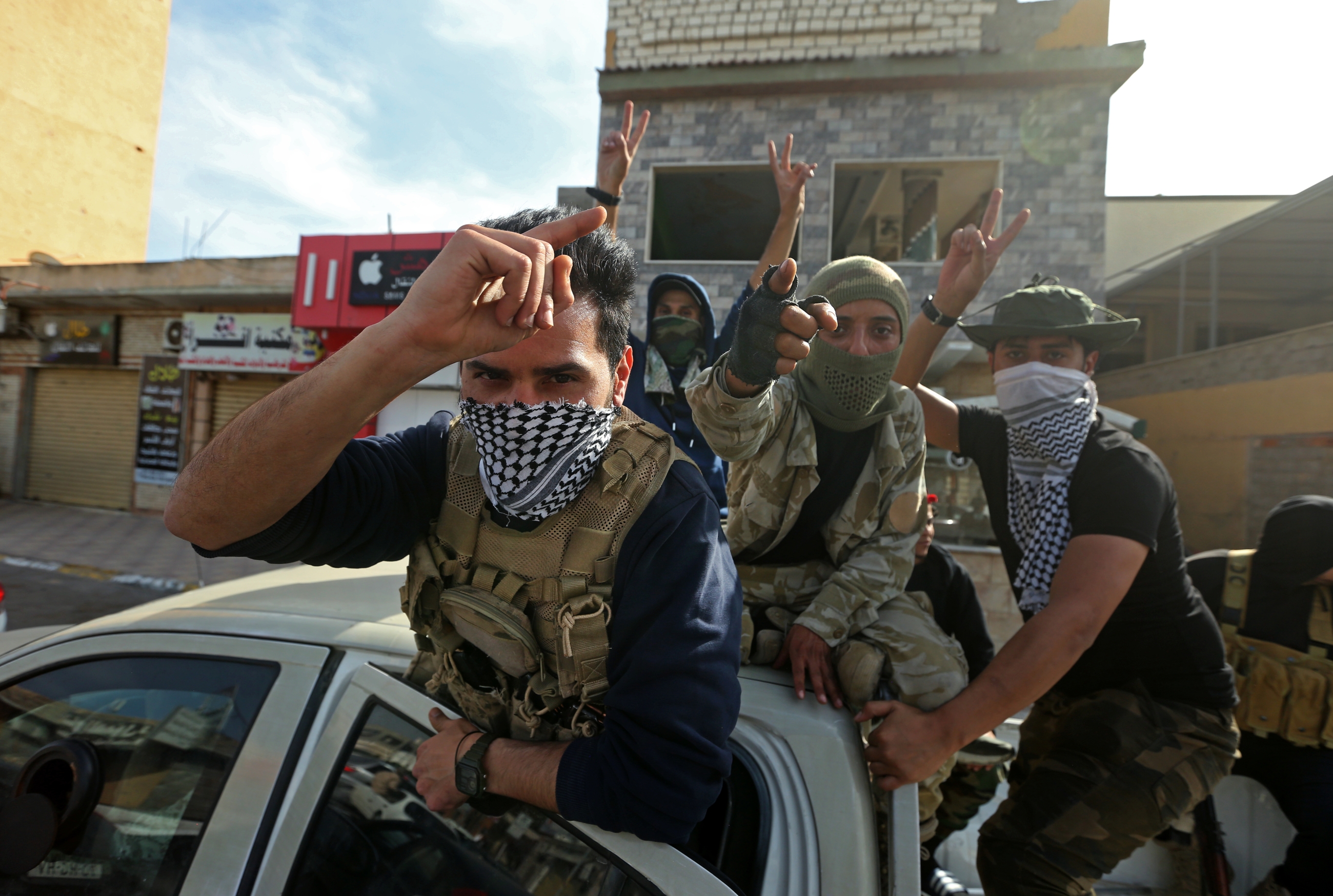
Police, military and security officials from Libya’s western towns of Sabratha and Sorman have gone into hiding, after forces loyal to Tripoli’s UN-backed Government of National Accord (GNA) took control of the area from the country’s eastern-based government’s Libyan National Army (LNA).
Among the GNA forces that led the Sabratha operation were several UN-blacklisted people smugglers and associated militias who, locals claim, have reimposed militia rule and are planning to restart their former illegal trade of sending boatloads of migrants towards Europe.
New MEE newsletter: Jerusalem Dispatch
Sign up to get the latest insights and analysis on Israel-Palestine, alongside Turkey Unpacked and other MEE newsletters
“These fighters from the Tripoli government are not the army, they are militias, and they are not working under the law, they are doing whatever they want,” Sabratha policeman Mohammed told Middle East Eye (MEE) over the phone from a secret location where he is now in hiding, fearing for his life.
Having worked with Libya’s Anti-Illegal Immigration Authority and familiar with local people-smuggling networks, he alleged that, among the ranks of the GNA forces who entered Sabratha, were several local militias infamous for controlling people smuggling operations along this stretch of coast.
“Starting this week, these militias will begin putting migrants to sea because this is how they make money, and they will be able to work freely because there is now no police, no law and no government,” Mohammed said, explaining that most official security personnel had, like him, fled the area.
“Now the sea is calmer, this is the start of the migrant-crossing season and it’s no coincidence that these militias have seized control at this time.”
'Now the sea is calmer, this is the start of the migrant-crossing season and it’s no coincidence that these militias have seized control at this time'
- Mohammed, Sabratha policeman
Claiming that several thousand migrants from sub-Saharan African countries were ready and waiting to cross the Mediterranean, Mohammed said: “Many migrants have been working, saving money and waiting for the smugglers to start work again, and now is their time, now they will try to reach Europe.”
His claims appear to be supported by footage widely circulated on social media showing a key figure at the centre of international people smuggling allegations, Ahmed Dabbashi - known as al-Ammu (the uncle) - lecturing locals following the GNA takeover.
Dabbashi, commander of the Anas al-Dabbashi brigade, has been under EU sanctions, including a travel ban and assets freeze, since June 2018 for being “a significant leader in illicit activities related to the trafficking of migrants”.
The UN sanction-listing notes that “there is extensive evidence that Al-Dabbashi’s militia has been directly involved in the illicit trafficking and smuggling of migrants, and … controls departure areas for migrants, camps, safe houses and boats.”
Separate video footage, also circulated on social media, appeared to show another UN-sanctioned individual, the former head of Zawiya Coastguard Abd al-Rahman al-Milad, who allegedly conspired with people-smugglers, participating in the operation to retake Sabratha.
Since the 2011 uprising that overthrew long-time leader Muammar Qaddafi, the people-smuggling trade has flourished in Libya, providing a lucrative revenue stream for militias and criminal gangs.
According to local sources, boats used by migrant smugglers currently retail for 20,000 Libyan dinar ($14,161) with the amount generated by selling places on the usually overcrowded vessels totalling around LYD 100,000 ($70,819), leaving smugglers with a $57,000 profit margin for each boat they put to sea.
“These people-smugglers don’t care if the migrants reach Italy or drown in the sea, their only concern is collecting money and sending the boats to the sea,” Mohammed said.
“And what do they need money for? To buy more guns and have more power.”
Militias hunt down police and army
Following the Sabratha takeover, locals who had openly voiced support for Libya’s eastern-based government and its LNA forces have been targeted, with several civilians allegedly assassinated.
A former headteacher who worked for the Ministry of Education was reportedly killed in a public execution.
“With no police or army, there is no law now in Sorman and Sabratha,” Mohammed said.
“These militias are looking for anyone who worked for the police or army, and many houses belonging to LNA supporters have been burned, their shops looted and their vehicles stolen.”
In the video footage, Dabbashi tells a group of gathered locals that security would be reinstated and looting and property burnings stopped.
But this claim rang hollow, a local source said, especially as no mention was made of the reinstatement of the police or official security apparatuses.
Although insisting that forgiveness and reconciliation were needed for future harmony, in the same speech, Dabbashi admonished locals for previously accepting the LNA and exhorted those present to obey the GNA.
“The violent way in which the GNA took control of the area is totally unacceptable,” said a businessman from Tripoli with associates in Sorman, speaking on condition of anonymity.
“Dabbashi is part of a powerful local tribe so the GNA probably thought he had sway and was a good option to lead the attack, but everyone knows about his involvement with smuggling and other criminal activities and, because he is wanted internationally, the fact he is free to lead military operations is very embarrassing.”
The alleged offences in Sabratha, which lies just 60km from the capital, are the latest in a string of human rights abuses that forces affiliated to both Libya’s rival governments have been accused of during the year-long Tripoli offensive.
Each side routinely accuses the other of targeting civilians, deploying mercenaries, and relying heavily on rival international backers. All parties have consistently contravened a long-ignored UN arms embargo, in place since 2011.
The United Nations Support Mission in Libya issued a statement noting its grave concern about reports on attacks against civilians, the desecration of corpses, looting, and theft and torching of public and private properties in Sabratha and Sorman, saying, if verified, these would constitute grave violations of international humanitarian law.
Fears of IS resurgence
Before LNA-affiliated forces took nominal control of Sabratha some two years ago, the area had been largely left to its own devices by successive competing governments. Militia-rule, criminality and rising extremism, including Islamic State (IS) activities, flourished.
In 2014, a British engineer and his New Zealander girlfriend were shot dead on a beach near Sabratha where they had been picnicking.
In 2016, two abducted Serbian embassy staff were among 49 people killed in a US air strike on an IS training camp, believed to be where Tunisian militant Noureddine Chouchane, who killed dozens of tourists in a 2015 beach attack in Tunisia’s Sousse, had been radicalised.
The GNA has been criticised for incorporating internationally sanctioned military figures and brigades with dubious affiliations into its ranks, and several who recently appeared in Sabratha have also been linked to IS and the Libyan al-Qaeda-affiliate Ansar al-Sharia.
Dabbashi’s UN sanctions-listing states: “The al-Dabbashi clan … have long-standing links with Islamic State in the Levante (ISIL) and its affiliates … and threaten peace and stability in Libya and neighbouring countries.”
Following the GNA’s takeover of Sabratha and Sorman, Tunisia announced it was boosting monitoring and security along its Libya border, approximately 100km to the west of Sabratha.
The video footage from Sabratha also showed the former spokesperson for the Ansar al-Sharia-affiliated Shura Council of Benghazi Revolutionaries, Faraj Moussa al-Hesnawy, standing on crutches - due to wounds sustained in Tripoli late last year - outside a police station that had been set ablaze.
Hesnawy, known locally as Shakko, was photographed beneath IS’s black flag while fighting LNA forces in Benghazi.
Local fears of an IS resurgence by such military figures with dubious affiliations have been compounded by the release of some 400 prisoners from Sorman Prison.
Among these, Mohammed said, were 15 IS fighters, and members of a criminal gang implicated in 30 cases of murder, kidnapping and attacks on government buildings and charged with the 2015 kidnapping and killing of three children of a rich local businessmen.
'Libyans want the official military and police now, as they have had enough of militias. We have all had enough of militias'
- Mohammed, Sabratha policeman
“These are very dangerous people who pose a serious threat to all Libyans,” he said.
The GNA’s interior ministry gave the escaped convicts three days to surrender themselves to the authorities, a widely ridiculed notion in a country where ongoing civil conflict has left law and order on the back-burner.
“The case of the escaped prisoners will crack social cohesion and locals, of course, blame the GNA and will be eager to support whoever can recapture these criminals,” said the Tripoli businessman.
“If the GNA can do it, that might improve their support but many believe only the LNA are able to enforce that level of security.”
The LNA has intensified fighting on Tripoli’s southern front lines and pressed deeper into the city since losing the western towns. On Sunday, it released video footage showing the capture of Dabbashi’s 24-year-old younger brother.
For Mohammed, the only circumstances under which he would consider returning to his hometown are if the LNA retake the area.
“I won’t go back to my home or my job until the LNA regains control,” he said. “And the LNA will return because they have massive local support.”
He insisted this support was not for the eastern government’s military commander Field Marshal Khalifa Haftar but rather for the stability his forces represented, saying that, under LNA control, his area had seen a return of law and order, largely absent since the 2011 uprising.
“I am not only talking about Sabratha and Sorman. Libyans in general want the official military and police now, as they have had enough of militias. We have all had enough of militias.”
This article is available in French on Middle East Eye French edition.
Middle East Eye delivers independent and unrivalled coverage and analysis of the Middle East, North Africa and beyond. To learn more about republishing this content and the associated fees, please fill out this form. More about MEE can be found here.


